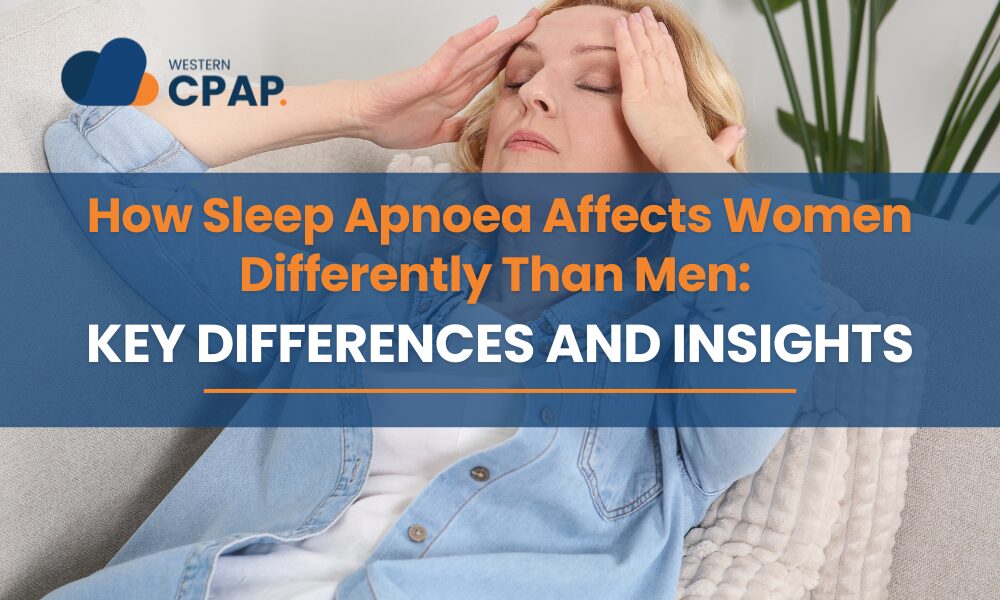- Free Shipping Options Available On Orders Over $300
- Price Match Guarantee
- FAQ
How Sleep Apnoea Affects Women Differently Than Men: Key Differences and Insights

Sleep apnoea is a serious yet frequently overlooked condition that significantly affects women’s health and wellbeing. Although often associated with men, it is vital to recognise how sleep apnoea manifests differently in women.
At Western CPAP, we are committed to raising awareness and providing support tailored to women’s needs. In this article, we will delve into the key differences in how sleep apnoea presents in women compared to men, offering insights that can aid in navigating diagnosis and treatment more effectively.
Unravelling Sleep Apnoea: A Brief Overview
Sleep apnoea is a prominent sleep disorder characterised by repeated interruptions in breathing during sleep. These interruptions, known as apnoeas, can vary significantly in duration and frequency, often occurring multiple times throughout the night. This leads to a fragmented sleep cycle, preventing the deep, restorative sleep essential for optimal health. The most common form of this disorder is obstructive sleep apnoea, which happens when the muscles supporting the soft tissues in the throat, such as the tongue and soft palate, temporarily relax. This relaxation narrows or closes the airway, momentarily cutting off breathing.
Understanding the mechanics and consequences of sleep apnoea is crucial for recognising its unique manifestations, particularly in women who may experience the condition in less typical ways. Acknowledging these nuances is the first step towards ensuring appropriate diagnosis and treatment, paving the way for healthier, more restorative sleep.
Why Women’s Apnoea Symptoms Often Go Unnoticed
Recognising sleep apnoea in women can be particularly challenging due to the subtlety and diversity of their symptoms compared to men. Instead of overt signs like loud snoring or noticeable breathing interruptions, women often experience less conspicuous issues such as chronic fatigue, morning headaches, and mood swings. These symptoms are frequently misattributed to stress, depression, or the rigours of daily life, masking the underlying sleep disorder. Additionally, insomnia, a common complaint among women, can both stem from and contribute to the complexity of diagnosing sleep apnoea.
This difference in symptomatology means many women live without a correct diagnosis, attributing their tiredness and emotional distress to anything but sleep apnoea. It is crucial for both women and healthcare providers to be aware of these nuances to ensure timely and accurate diagnosis, leading to appropriate treatment. Recognising the unique way sleep apnoea manifests in women is essential for bridging the gap towards equitable healthcare and better sleep for all.
The Influence of Hormones on Women’s Sleep Apnoea
Hormones are like the body’s internal messengers, playing a pivotal role in various health aspects, including sleep patterns and disturbances. In women, hormonal changes are a significant factor influencing sleep apnoea’s onset and severity. For instance, during pregnancy, the surge in hormones and accompanying weight gain can contribute to obstructive sleep apnoea by increasing neck girth and causing fluid retention, which may narrow the airway. Similarly, the journey through menopause brings about its own set of challenges. The decline in oestrogen and progesterone levels can affect muscle tone in the throat and lead to increased relaxation of these muscles during sleep, thereby heightening the risk of airway obstruction.
Understanding the complex interplay between hormonal fluctuations and sleep apnoea is crucial for women. It shines a light on why some may begin to experience or notice an escalation in symptoms during these transformative phases of life. Awareness and knowledge about these hormonal influences empower women to seek timely advice and support, ensuring a proactive approach to managing sleep apnoea.
The Impact of Sleep Apnoea on Women’s Heart Health
The relationship between sleep apnoea and heart health in women is a significant concern. For women dealing with sleep apnoea, the stakes for heart health are notably high. The condition’s characteristic interruptions in breathing can lead to drops in blood oxygen levels. These nocturnal disturbances put extra strain on the heart, potentially contributing to a spectrum of cardiovascular issues. For women, this risk extends to a heightened likelihood of hypertension, heart disease, heart failure, and arrhythmias.
The underlying mechanisms involve the stress that repeated oxygen deprivation and subsequent re-oxygenation place on the cardiovascular system, making the heart work harder than it normally would. This underscores the importance for women, particularly those experiencing or at risk of sleep apnoea, to be vigilant about their heart health. Regular monitoring and managing sleep apnoea can play a crucial role in mitigating these risks and safeguarding heart health. Taking control of sleep and heart health is an empowering step for women, ensuring they remain vibrant and healthy.
Navigating Diagnosis and Treatment: A Woman’s Guide
Navigating the path to diagnosis and treatment for sleep apnoea as a woman requires perseverance and self-advocacy. Given the subtleties of symptoms women experience, it’s paramount to listen to your body and speak up about any concerns with a healthcare provider, particularly if you’re experiencing symptoms like chronic fatigue or mood changes. Initiating this conversation is the first step towards uncovering whether sleep apnoea might be affecting your sleep and overall health.
The process typically involves undergoing a sleep study, which can be arranged either at a specialist sleep lab or within the comfort of your own home. This study will monitor your breathing patterns, brain activity, and other vital signs during sleep to determine if apnoea events are occurring.
Based on the findings, a range of treatment options can be explored. These may range from implementing lifestyle modifications, such as weight management and altering sleep positions, to medical interventions like CPAP therapy, which uses a machine to keep your airway open during sleep. In some cases, oral appliances or even surgery might be recommended, depending on the severity and nature of the condition.
Remember, every woman’s journey with sleep apnoea is unique, and finding the right treatment may take time. With the right support and information, you can navigate this journey confidently, towards better sleep and improved health.
Improve Your Sleep Health—Contact Western CPAP Today!
Sleep apnoea is a serious yet frequently overlooked condition that significantly affects women’s health and wellbeing. Although often associated with men, it is vital to recognise how sleep apnoea manifests differently in women. Understanding these differences is crucial for accurate diagnosis and effective treatment, ensuring women receive the care they need.
At Western CPAP, we are committed to raising awareness and providing support tailored to women’s needs. If you suspect you might be suffering from sleep apnoea, don’t wait. Seek professional advice and take the first step towards better sleep and improved health.
Ready to take control of your sleep and wellbeing? Contact us on (08) 6185 1856 to schedule a consultation. Our team of experts are here to help you navigate your diagnosis and find the right treatment options. Don’t let sleep apnoea hold you back—start your journey to healthier sleep now!




